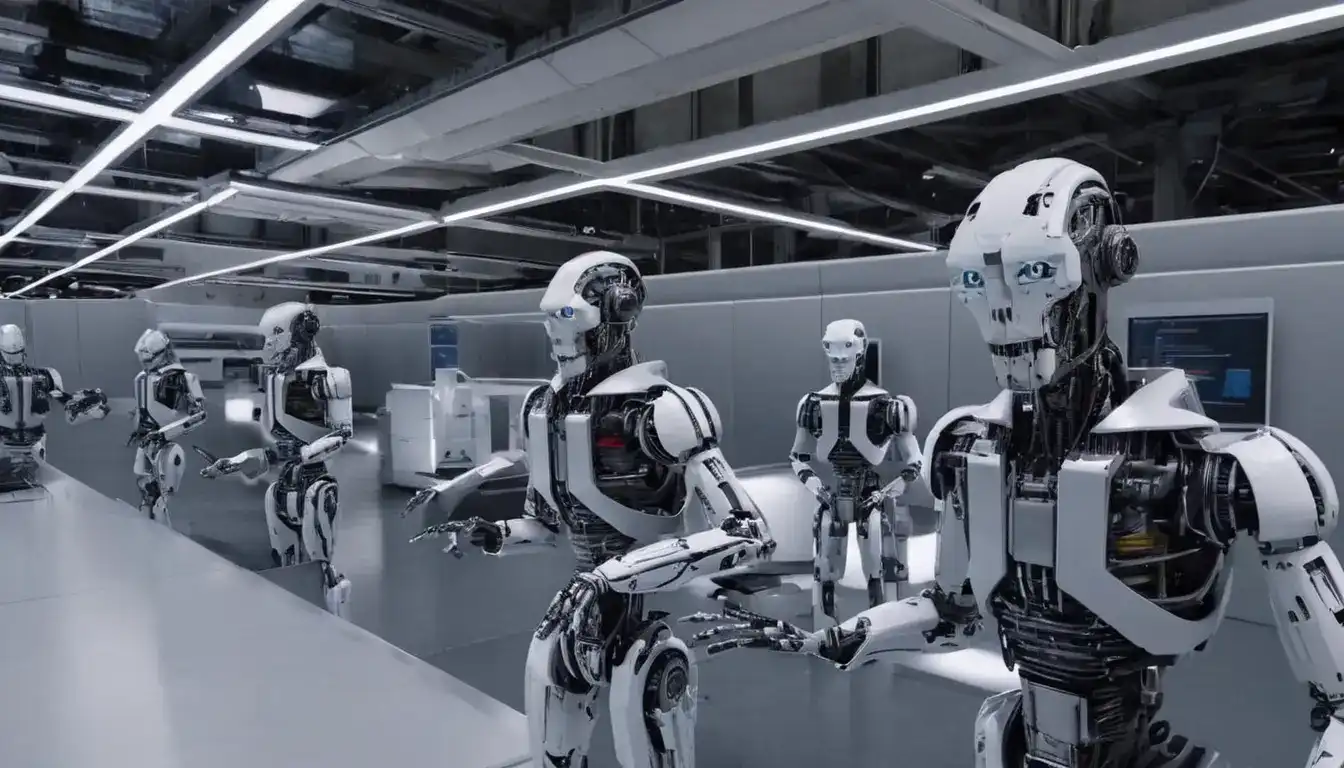Develop Strong Leaders
Emily Willis

Photo: Develop Strong Leaders
Cultivating Tomorrow's Visionaries: How to Develop Strong Leaders
In an ever-evolving world, the demand for strong, adaptive, and visionary leaders has never been more critical. From multinational corporations to local community groups, effective leadership is the linchpin of success, driving innovation, fostering resilience, and inspiring collective achievement. But are leaders simply born, or can leadership be developed? The resounding answer is that while some may possess innate qualities, strong leadership is a skill set that can be cultivated, honed, and mastered through intentional effort and strategic development.
This article delves into the profound importance of leadership development, outlining the core qualities that define effective leaders and providing actionable strategies to help individuals and organizations cultivate tomorrow's visionaries. Whether you're an aspiring leader, a seasoned professional, or an organization looking to strengthen its talent pipeline, understanding how to develop strong leaders is an investment that yields immense returns.
Why is Leadership Development Crucial?
Investing in leadership development is not merely a perk; it's a strategic imperative for any entity aiming for sustainable growth and success. Strong leadership directly impacts an organization's performance, culture, and ability to navigate complex challenges.
Organizational Resilience and Agility
The business landscape is characterized by constant change and disruption. Organizations with strong leaders are better equipped to adapt, innovate, and steer through uncertainty. Effective leadership development programs "future-proof" a company by preparing leaders to address current challenges and anticipate future disruptions, enhancing organizational agility and resilience. Leaders who can navigate complexities and guide their organizations to success are vital in a world reshaped by digital technology, intense competition, and changing demographics.
Employee Engagement and Retention
One of the most significant benefits of strong leadership is its direct correlation with improved employee engagement and retention. When leaders are equipped with the right tools and training, they can better motivate their teams, recognize individual contributions, and foster a positive work environment. Engaged employees are typically more productive, more committed to their work, and less likely to leave, leading to lower turnover rates and higher talent retention for the organization. Companies that prioritize leadership development experience significantly higher employee retention, with some studies showing it to be 20 times greater.
Innovation and Growth
Strong leaders are catalysts for innovation and growth. They inspire teams, foster a culture of creativity, and make informed decisions that drive progress. By developing leaders who can think strategically, solve problems, and influence outcomes, organizations can unlock new opportunities and achieve their business objectives more effectively. Leadership development builds the capacity to reduce costs, drive new revenue streams, and improve customer satisfaction, all contributing to superior financial performance.
Core Pillars of Developing Strong Leaders
To develop strong leaders, it's essential to understand the fundamental qualities and skills that underpin effective leadership. While leadership styles may vary, certain core competencies are universally recognized as vital for success.
Self-Awareness and Emotional Intelligence
A hallmark of great leadership is the ability to understand and manage one's own emotions, as well as recognize and respond to the emotions of others. Emotional intelligence enables leaders to handle stress, build strong relationships, and create a positive, productive team environment. Cultivating self-knowledge strengthens emotional stability and the ability to make decisions without constantly seeking validation, fostering confidence and clarity.
Effective Communication
Clear, concise, and empathetic communication is a cornerstone of strong leadership. Leaders must articulate their vision, provide guidance, and actively listen to their teams to minimize misunderstandings and ensure everyone is aligned. Good communication skills are essential for building trust, sharing information, and keeping teams working smoothly. This includes both conveying ideas and actively listening to others' perspectives.
Strategic Thinking and Vision
Effective leaders look beyond immediate tasks, focusing on long-term goals and anticipating future challenges. They identify opportunities, align their teams with a clear vision, and plan strategically to position themselves and their organizations for sustained success. Strategic thinking is crucial for driving positive change and making informed decisions that influence outcomes at every level.
Decision-Making and Problem-Solving
Leaders are constantly faced with difficult decisions and complex problems. The ability to make informed choices, assess situations, and provide sensible solutions is critical for guiding teams and achieving goals. Strong leaders analyze information, weigh options, and make decisions confidently, even under pressure.
Delegation and Empowerment
Good leaders understand that they cannot (and should not) do everything themselves. Delegating tasks based on team members' strengths not only builds their confidence and capabilities but also improves overall productivity. Empowering others, through trust, motivation, and open communication, makes team members feel valued and capable, driving collective success.
Resilience and Adaptability
The capacity to bounce back from setbacks, maintain a positive outlook, and adapt to changing circumstances is vital for leaders. Resilient leadership projects a positive attitude that helps others maintain emotional strength and commit to a shared vision, even in challenging times. Adaptability is essential for navigating unpredictable business environments and leading through organizational change.
Practical Strategies for Leadership Development
Developing strong leaders requires a systematic and continuous approach. Organizations and individuals can employ various strategies to cultivate the necessary skills and mindsets.
Formal Training Programs and Workshops
Structured training programs and workshops provide foundational skills in areas such as effective communication, decision-making, and problem-solving. These programs can offer practical tools and strategies for leadership growth, allowing participants to learn from trainers and peers in a focused setting. They are particularly beneficial for prospective and emerging leaders, equipping them with essential competencies.
Mentorship and Coaching
Pairing emerging leaders with experienced professionals through mentorship programs offers personalized guidance, knowledge transfer, and valuable insights. Coaching, often more structured and goal-oriented, focuses on achieving specific results within a predetermined timeframe. Both mentorship and coaching provide critical support for skill development and career progression, fostering a culture of continuous learning and growth.
Experiential Learning and Stretch Assignments
Leadership is often best learned through doing. Experiential learning, such as managing projects, leading cross-functional teams, or taking on stretch assignments, provides practical application of theoretical knowledge. These opportunities allow leaders to develop skills in real-world scenarios, fostering adaptability and problem-solving abilities. Job rotation, particularly at senior levels, can also provide valuable exposure to different organizational functions.
360-Degree Feedback and Performance Reviews
Regular feedback is crucial for continuous growth and development. 360-degree feedback, which collects input from peers, subordinates, and superiors, offers a comprehensive view of a leader's strengths and areas for improvement. Performance reviews, coupled with constructive criticism, open conversations for improvement and help build stronger relationships between leaders and team members.
Building a Culture of Continuous Learning
Ultimately, developing strong leaders requires fostering an organizational culture that values and promotes continuous learning. This involves encouraging self-reflection, providing access to learning resources, and creating an environment where leaders model the pursuit of knowledge and skill enhancement. A culture of continuous learning ensures that leadership development is an ongoing process, not a one-time event.
Overcoming Common Challenges in Leadership Development
Despite the recognized importance of leadership development, organizations often face hurdles in their implementation. Understanding these challenges is the first step toward overcoming them.
Lack of Time and Resources
One of the most common challenges is the difficulty in allocating dedicated time and resources for leadership development initiatives amidst pressing operational demands. To address this, organizations must prioritize development, delegate tasks effectively, and schedule dedicated periods for training and growth. Leadership training, while requiring time, is a worthwhile investment that can uplift a company and help it progress towards its goals.
Resistance to Change
Individuals and organizations may exhibit resistance to new approaches or changes in established leadership styles. Overcoming this requires promoting openness to learning, demonstrating the tangible benefits of new skills, and gaining buy-in from senior leadership. Effective leadership development programs should focus on the practical application of knowledge and skills to ensure leaders can connect what they learn to real job challenges.
Measuring ROI of Development Programs
Quantifying the return on investment (ROI) of leadership development programs can be challenging, but it's crucial for demonstrating their value and securing continued support. Establishing clear, quantifiable goals aligned with organizational objectives, using 360-degree feedback, and tracking behavioral shifts over time can help measure impact. Studies show that effective leadership directly influences profitability, productivity, and employee retention, providing strong evidence of ROI.
The Role of Organizational Culture in Nurturing Leaders
An organization's culture plays a pivotal role in nurturing and sustaining strong leaders. A supportive culture encourages growth, embraces feedback, and values the development of its people. When the corporate culture aligns with the mission, vision, and values, leaders are more effective in communicating these elements to their teams, creating a ripple effect that ensures everyone is moving in the same direction.
Companies that successfully develop strong leaders often have cultures that:
- Prioritize People: They identify and cultivate leaders who prioritize people and demonstrate adaptability.
- Encourage Accountability: Effective leaders create a culture of accountability and performance by setting clear expectations and providing feedback.
- Foster a Growth Mindset: They encourage continuous learning and provide opportunities for employees to grow and advance [10, 1
Latest ✨
View Allcreating engaging content to attract and retain customers in the digital age. It provides strategies for understanding the audience, setting content goals, creating high-quality content, using storytelling and emotional connection, and optimizing content for conversions. It also covers content formats and distribution, measuring and analyzing content performance, and building relationships with influencers and user-generated content.
Emily Willis
Rediscover the power of play! It's not just for kids—it's the secret to unlocking future learning, essential skills, and human potential at every age.
Emily Willis
Unlock startup success! Learn the key differences between business incubators and accelerators. Discover which support system is ideal for your venture's growth...
Emily Willis
The world of work is changing rapidly due to automation, AI, and technological advancements. While some fear widespread unemployment, the reality is more nuanced. The future of work is about humans adapting, reskilling, and exploring new market opportunities. Automation is increasing efficiency and reducing costs, but also shifting the job landscape.
Emily Willis
Business
View All
August 5, 2024
5 Keys to Success in Starting a New Business in the Digital AgeThe digital age has brought both opportunities and competition to the business landscape. To succeed in this environment, it is important to identify market needs, develop a unique value proposition, build a strong online presence, embrace technology and data-driven decision making, prioritize customer experience, and foster a culture of innovation and adaptability.
Emily Willis

June 9, 2025
Succeed with SaaS Business ModelMaster the SaaS business model! This guide reveals strategies for building a thriving enterprise, from understanding the landscape to achieving product-market f...
Emily Willis

June 9, 2025
Step-by-Step Business RegistrationsNew business? Discover why registration is vital for legal protection, credibility, and funding. Our guide simplifies establishing your venture.
Emily Willis
Economy
View AllBeyond crypto hype: Understand digital asset economics. Learn core principles like supply, demand, scarcity & utility to navigate the market wisely.
Read MoreDemystify Forex trading. Discover its vast opportunities and navigate its inherent risks in the world's largest financial market.
Read MoreDiscover the foundations of banking stability. Learn how strong regulations, capital, deposit insurance, and technology build a resilient financial sector.
Read MoreEntertainment
View All
August 4, 2024
Profiles of Famous Artists Who Inspire the Younger Generationthe inspirational aspects of famous artists such as Vincent van Gogh, Frida Kahlo, Pablo Picasso, Banksy, Yayoi Kusama, Jean-Michel Basquiat, Georgia O'Keeffe, Andy Warhol, Kehinde Wiley, and Ai Weiwei. It highlights their perseverance, innovation, authenticity, social commentary, mental health advocacy, and representation, among other qualities, and how these aspects continue to inspire young artists to pursue their creative dreams.
Emily Willis

August 4, 2024
The Latest Music Trends, Artists Influencing Pop Culture, and How Digital Platforms Facilitate the Distribution of Music GloballyThe music industry is constantly changing due to consumer preferences, technology, and the influence of artists. Digital platforms have revolutionized music creation, distribution, and consumption, leading to genre fusion, the rise of independent artists, and collaborative projects. Influential artists like Billie Eilish, BTS, and Taylor Swift have shaped pop culture globally. Streaming services, social media, and direct-to-fan engagement have transformed music distribution. Digital platforms also promote cultural diversity and inclusivity, expand markets and revenue, and drive technological advancements. The industry is also focusing on sustainability and ethical practices. To succeed in the future, stakeholders must embrace digital transformation and champion inclusivity.
Emily Willis

August 5, 2024
Video Games: Enduring Appeal, Immersive Worlds, and Diverse Genresenduring appeal of video games, highlighting their ability to transport players to fantastical realms, challenge their minds, and foster connections with others. It explores the magic of immersive worlds, the vast array of genres available, and the social power of gaming.
Emily Willis
Health
View AllQuality sleep is essential for overall health and well-being, impacting physical, cognitive and emotional functioning. Lack of quality sleep can lead to a variety of health issues, including weakened immune function, heart problems, weight gain and cognitive impairment.
Emily Willis
Maintaining good health involves a balanced diet that provides essential nutrients for the body. A balanced diet includes carbohydrates, proteins, fats, vitamins, minerals, fiber, and water. Benefits of a balanced diet include enhanced energy levels, improved mental health, a stronger immune system, better weight management, reduced risk of chronic diseases, and enhanced digestion. Components of a balanced diet include fruits and vegetables, whole grains, protein sources, dairy or dairy alternatives, and healthy fats. Tips for maintaining a balanced diet include planning meals, portion control, staying hydrated, limiting processed foods, eating mindfully, and including physical activity.
Emily Willis
Regular physical activity is crucial for maintaining long-term health and well-being. It has numerous benefits, including improving cardiovascular health, aiding in weight management, enhancing mental health, strengthening bones, boosting immune function, and promoting longevity.
Emily Willis
Trending 🔥
View All
1
2
4
5
6
7
8
9
10
Lifestyle



Sports
View AllAugust 5, 2024
Sportsmanship in the Spotlight: Cultivating Respect, Integrity, and Ethical Behavior
Read MoreTechnology
View All
August 4, 2024
The Rise of Blockchain Technology: Applications Beyond Cryptocurrency
Blockchain technology, initially associated with cryptocurrencies, has expanded to have diverse applications across industries. It is a decentralized digital ledger that ensures secure, transparent, and immutable transactions. Beyond cryptocurrency, blockchain has been applied to supply chain management, healthcare, voting systems, smart contracts, digital identity verification, real estate transactions, and supply chain finance. Future trends include enhancing interoperability, addressing scalability issues, and exploring regulatory frameworks. Overall, blockchain technology has the potential to revolutionize various sectors by enhancing efficiency, security, and trust in operations.

August 5, 2024
Best AR Apps for Interior Design
Discover the top AR apps for interior design and transform your space with ease! From furniture placement to paint colors, these innovative tools will revolutionize the way you decorate, making your home design dreams a reality

August 5, 2024
AI Trend Predictions for 2024 and beyond
AI is no longer a futuristic concept, it is shaping our world at an unprecedented pace. In 2024 and beyond, AI trends are likely to dominate in various industries. Generative AI is expected to revolutionize content creation, design, and product development. In healthcare, AI will lead to personalized medicine, drug discovery acceleration, improved diagnostics, and remote patient monitoring.

August 4, 2024
AI-Powered Robots Take Over Manufacturing Jobs: Is Our Workforce Prepared?
AI-powered robots are transforming the manufacturing industry, leading to increased efficiency and improved product quality. While concerns about job displacement exist, AI is more likely to transform jobs rather than eliminate them.


















